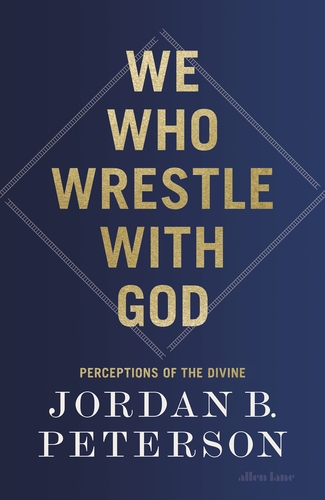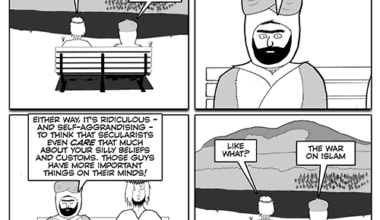
It sets out general premises that happen to be false—as will be shown. Then it develops specific arguments in which statement after statement is equally open to challenge (many examples will be provided out of this plethora—as many as can decently be fitted in). That, in a nutshell, is We Who Wrestle with God—Perceptions of the Divine, Jordan Peterson’s latest offering.
This is a book of sermons; each chapter takes a biblical tale as its subject, gives an interpretation of its meaning, and uses it to guide (and, when it deems it necessary, hector) its readership. The interpretations offered are mainly metaphorical. The originators may well have intended their stories more literally.
For those who neither believe nor feel any compulsion to do so, Peterson’s assertions elicit so many responses of the ‘No, it just isn’t so’ type that it becomes positively monotonous. You have been warned. (Or, if it isn’t ‘No, it’s not so’, the warranted response is, ‘Maybe so—but the opposite, or a different alternative entirely, could be argued just as persuasively. Thus you can hardly build a solid argument on that.’) Let’s start with two Peterson premises. He sets out his handful of biblical exegeses at length—it’s a 500-page book—but the two assertions in question are axioms because, while being views that underlie all else, they seem so obvious, to him, that all that is needed is to flatly declare them.
One: ‘The biblical corpus… is the story on which Western civilization is predicated’. No, that is just not so. The West is not predicated on a story: rather, if what made the West distinctive is to be traced back to one source, it isn’t the tales, packed with heavenly beings and miraculous happenings, of the Mesopotamians, Egyptians, Hebrews, or early Christians. The source is the writings of those Greeks who dared to break precisely with an archaic, magical mindset and seek rational answers, casting supernatural interventions aside.
Two: ‘The world has to be filtered through the mechanism of story to become comprehensible or even apprehensible’. No—that is only so for primitive minds. And for otherwise sophisticated minds, like Peterson’s, which still hanker for that kind of thing—but they (he) should not extend this to everyone else. Even children can understand that it is dangerous to stick their fingers in the electrical outlet without being told that once there was a child who did that and a god came down in a chariot and ran him over, or whatever. Peterson does define ‘story’ in a rather general and abstract way (although, in practice, he mostly uses the term in its customary restricted sense). But a sensible mind does not need stories, even generalized kinds of stories, to face and remain unfrazzled by the circumstance that the existing world contains ‘simply too many facts’, something which greatly distresses Peterson.

Peterson loves biblical stories so much because he discerns essential bits of truth in them that teach lessons. Two observations about that. First: with a maturing of understanding, any such kernels of truth can be distilled and handled directly, separating the flimflam elements for occasional recreational reading, not persistent awe. Akin to taking a medicine for the useful active ingredient it contains, instead of swallowing the whole thing from which it was derived.
The second observation is that Goldilocks, too, contains kernels of truth and has a lesson to teach, as do other fables and fairy tales. Yet nobody goes around making a religion out of Goldilocks, or the rest of those tales… Wait! Come to think of it, what an overlooked opportunity here! It offers Aesop, the Grimm brothers, La Fontaine, Andersen as prophets—maybe even gods? This idea is given gratis to anyone seeking to launch a new religion. (However, if afterwards he or she feels like kicking back some small share of the generated income…)
This is a good time to emphasise that people are entitled to believe, and proselytise, anything they care to, or not to ‘believe in anything’, and proselytise that—the proviso being that none of this be forced on others. Peterson, for that matter, might—if circumstances had been different—have come to believe in ghosts, amulets, magic potions, jinxes, astrology, or haruspication, and would be presenting arguments for them. In the event, he is a propagandist for Christianity, so let us go back to his biblical expatiations.
It needs to be mentioned that the ‘wrestling’ referred to in the book’s title, although making the good-sounding gesture of saying ‘we’, actually applies only to the readers; Peterson prefers to sound perfectly secure in his own positions. In particular he never has a glimmer of doubt that God exists, and that ‘the divine’, therefore, is a thing. Any purported struggle that emerges appears about as genuine as pro wrestling.
The stories the Canadian author chooses here are from the Old Testament; he works Christ into some of the discussions but mainly leaves him for a further volume. The text is richly studded with half-truths, contradictions, outright falsehoods, statements that are true but not really relevant, statements that beg for justifications but get none, even false ones; and more. Also included are the de rigueur sermonic fulminations against money and, especially, sex ‘merely’ for pleasure (horrors!). Examples were promised:
‘The opposition to enslavement… is genuine belief, and religious belief, at that.’ No, and it takes some nerve to say that in a book about the Bible, since the Bible doesn’t oppose slavery. Many years later some people, religious and non-religious alike, evolved anti-slavery stances and pursued them with the kind of zeal that often characterises religion, but anti-slavery was not originally taken from religion. As with the U.S. Founding Fathers, when its creators spoke of equality for all, they didn’t include slaves.
Peterson should simply speak for himself—not generalize to all.
‘Lack of… belief or faith makes the terrible relationships and polities that man can also create the true hell that they far too often become.’ Firstly, that’s unclear syntax. Is man creating a true hell directly, or creating relationships and polities, which because of a lack of belief, turn into hell? (On consideration, it appears the latter was intended.) Secondly—and this is the serious part—to connect lack of belief and faith with hell, in either of those two ways, takes even more nerve than in the previous example. It has been belief and faith themselves that have far more frequently, over the course of history, created hell with their attendant religious wars and hideous persecutions.
To ‘believe in nothing’ means to ‘suffer the terrible anxiety-provoking, hope-devouring, and socially destabilizing consequences’. No, regarding anxiety and hope, Peterson should simply speak for himself—not generalize to all. As for social stability, it is a different matter, although he mentions all three together. For that, yes, religion, being socially conservative to a big fault, often provides stability. Until, of course, some members of the society acquire other religious notions, as in Protestant versus Catholic, or Shiite versus Sunni. Then it is belief that has ‘terrible socially destabilizing consequences’.
Regarding Adam and Eve, even as Peterson adopts the position that man and woman are equally worthy inventions of God’s, he contradicts himself (an error of reasoning)—averring that the female is rendered ‘arguably more susceptible to the lure of the serpent (or at least first susceptible).’ That’s traditional religious misogyny (a moral error), allowed to slip out.
Women ‘are attracted, first and foremost, by competence and confidence’. No, it isn’t so. Point 1, in this case, the first is not the same as the foremost. Competence and confidence may ultimately be foremost. Point 2, what attracts women first (despite what they may tell social researchers, or even themselves, afterwards) may be a fellow’s long eyelashes, or his looking good in a turtleneck sweater, or his being in a band. It is no different from the fact that what men notice first are—let’s be honest here—faces and boobs.
‘The upward-striving spirit exemplified by all the various characters of God… appears central to the motivation of man, woman and cosmos alike.’ Independently of whether that’s true for man and woman, this statement in passing also affirms that the cosmos has a motivation, which is a real philosophical biggie to smuggle in. Or else it implies that the cosmos is God, which may be more pantheistic than Peterson bargained for when he thought up this ringing phrase.
This is downright effrontery. Throughout the ages, religion has fought tooth and claw against the spirit of genuine inquiry.
‘The sexual metaphor is apt… We describe ourselves as being f**ked with…’ (this in the chapter on Cain and Abel, and using the book’s typography); ‘…as being f**ked over…, of things being all f**ked up…’ Here Peterson falls into an old trap: that of using, in what is supposed to be a generally applicable argument, a circumstance that occurs in the writer’s own language but not in others. In different languages, the same situations he alludes to are handled not with sexual but with other metaphors, often excretory—German and at least some regional variants of Spanish being examples of the latter.
‘We have radically increased the average span of life… This improvement is often attributed solely to technological progress, an accounting that fails to take into account [sic]… the prior development of the… spirit of genuine inquiry… [t]hat in turn depended on faith…’ This is downright effrontery. Throughout the ages, religion has fought tooth and claw against the spirit of genuine inquiry. Why not? It already had all the answers, handed down from on high. Take Michael Servetus, whom Calvin caused to be burned alive for daring to avow the circulation of the blood. Take Giordano Bruno, whose espousal of the Copernican model was no help when he was tried, likewise tied to a stake, and set on fire. Take Copernicus himself, or Galileo… Peterson tries to dissemble by shifting his definition of faith for this bit. But even so, he is openly attempting to associate the (historically antithetical) ideas of ‘faith’ and ‘scientific progress’, which is an insult to the latter and so many other genuine inquirers.
‘Even when God is dead’ (this after mentioning Nietzsche) ‘he maintains his existence not only in the depths but in the patterned order of being and becoming itself.’ No, this cannot be so. If the meaning of this metaphysical murk is that something exists if the idea of it has become widespread and persists—which appears to be a reasonable interpretation of the sentence—then it also confers existence on the mythical Eastern potentate Prester John; at least, it ‘maintained his existence’ during a large chunk of the Middle Ages. (It also makes Peterson a closet Platonist, in that he sees ideas as having not just an important but a preternatural role.)
Peterson repeatedly rails against attempts to tone down the manner in which man lords it over nature, because he, Peterson, shows himself only capable of seeing this as an effort to place nature over man. But that isn’t the only alternative to man over nature; the intended one is man neither above nor below, but more firmly a part of nature.
‘God is presented as the unity… In the absence of that unity, there is… anarchy and chaos, or… the spirit of power that… produces the scarlet beast of the degenerate state’. Never mind the scarlet, or purple, language. No, there is another potential outcome of lack of unity that he doesn’t seem to realise exists. Namely, diversity and complexity. He may, like many others, like them far less than unity, but that does not rule them out as a possible opposite of unity, distinct from anarchy et al.
Re Socrates, ‘Was he in fact the world’s first genuinely expert thinker? Was that… the emergence of the inner voice [i.e., conscience]?’ Peterson poses these two queries but doesn’t answer them. The trouble with rhetorical questions is that they only work when the questioner gives clues as to which way he expects the answers to go. Peterson uses such questions sparingly at first but by his final sermon, on Jonah, isn’t it the case that they multiply mightily? With Socrates, the reader is left rather perplexed as to his intent. In any case, no; Thales came long before Socrates (a fact), and again no, people had consciences long before either (a reasonable assumption). Further, how dare any religious apologist seek to make hay with Socrates, when it was religion—a charge of impiety—that led to his judicial murder?
Re Jonah’s great fish, ‘At its peak… the whaling industry was the fifth largest commercial enterprise in the U.S.’ Yes, but irrelevant. The tale’s teachings would be the same if whaling had always remained minor (we wish!). Peterson builds up a case that ‘whales have been hunted by human beings for thousands of years’ for ‘precisely’ the value of ‘a creature of that size’. Again, what of it? Human beings have also collected tiny clams and berries for thousands of years.
In live debates, Peterson piles on the fallacies so thick and fast that his interlocutors cannot refute them one by one, or the conversation would never move forward.
To squeeze in just one more: ‘Those with the temerity to presume that their attitude of hypothetically enlightened doubt is the proper and admirable response to these deepest of fairytales… [are] ‘(m)oral dwarfs, equipped with hydrogen bombs.’ (By now Peterson has become really worked up, and uses language like, ‘And bloody well beware of presuming that in the situation facing Jonah, you would have acted differently.’ But back to the moral dwarfs.)
Here, preacher—insult the other cheek! However, passing over the slander, it may be noted that those who in point of fact are equipped with hydrogen bombs aren’t systematic doubters, but mainly Putin and Trump. Independently of any debate on moral stature, the former espouses Russian Orthodoxy, while the other calls himself a non-denominational Christian (and enjoys as one of his electoral bulwarks the unbending support of those who doubt not a thing, least of all their deepest fairytales; i.e. evangelical Christians, not to mention the Christian nationalists). Is Peterson instead harking back to Stalin and Mao? They didn’t pore over fables much; Orthodoxy has returned to Russia big-time, while China festers with superstitions, if not more organized religions. No: Peterson’s wrath is against doubters today—whose power is imaginary. H-bombs, no less!
In live debates, Peterson piles on the fallacies so thick and fast that his interlocutors cannot refute them one by one, or the conversation would never move forward. Thus, by the time the bigger zingers come, the rhetorical advantage appears to have accumulated in Peterson’s favour. In print, readers get the time to examine each sentence with proper care. The question arises: is it worth it? Answer: no, not really.
In sum: we who wrestle with Jordan Peterson, can, but need not.
Related reading
A reading list against the ‘New Theism’ (and an offer to debate), by Daniel James Sharp
‘The Greek mind was something special’: interview with Charles Freeman, by Daniel James Sharp
American democracy will soon turn 250. Freethought can reinvigorate it. By Patrick Seamus McGhee
The philosopher’s curse(s), by Nicholas E. Meyer
Feminism and religion are incompatible, by Maryam Namazie









Your email address will not be published. Comments are subject to our Community Guidelines. Required fields are marked *
Donate